Butter
Is butter good for you? In the past, people thought butter was unhealthy because it has saturated fat, which meant it was harmful to the heart.1 But nowadays, we know better. When eaten in moderation, butter can be good for you.2 It provides quality fats and vitamins that are essential to your body.
So, even though butter used to have a bad reputation, now it can be part of a balanced diet, including the Bulletproof diet. In fact, Bulletproof started with our founder enjoying butter in tea while travelling in Tibet. He returned to the United States and decided to try butter in coffee which lead to our signature recipe for signature recipe for Bulletproof coffee.
Read on to learn about butter nutrition and butter benefits. You’ll also discover the difference between ghee vs. butter and how butter can play an important role in your keto or low-carbohydrate diet.
What Is Butter?
Butter is a dairy product made by churning cream or milk, separating the solid fats from the liquid, known as buttermilk. It’s easy to make—you can even make butter yourself at home. It’s primarily comprised of milk fat, with a small amount of water and milk solids. It’s made up of saturated fats, which are solid at room temperature and mainly derived from animal sources.
What’s the difference between saturated and unsaturated fats? Unsaturated fats, like those found in vegetable oils, are liquid at room temperature and primarily come from plant sources. Saturated fats may increase LDL cholesterol if you eat too many. Unsaturated fats, found in foods like olive oil, can improve heart health by lowering LDL cholesterol levels.3
Although butter contains saturated fats, it has many beneficial nutrients that may contribute to a balanced diet. So, what are the health benefits of butter?
Benefits of Butter
You may be surprised to find out how butter nutrition fuels your body. Here are just some ways butter can benefit you:
Lucky for us butter lovers, scientists continue to find new ways that butter’s nutritional profile can benefit our bodies and minds.
The Science-Backed Benefits of Butter
A low-carb, high-protein, high-fat diet may help certain people manage their blood sugar levels, according to a recent scientific study.10 After six weeks, participants showed better blood sugar control and reduced fat in the liver compared to those who had followed a regular diet. Including butter in a low-carb diet could help improve certain health-related concerns.
Butter is a source of conjugated linoleic acid (CLA), which was linked to weight management in a recent scientific study of 74 obese or overweight women.12 The results showed that the women who took CLA supplements had less fat in various parts of their bodies, like around their organs and in areas like the belly and hips. Adding foods to your diet that contain CLA might help with weight management.
Scientific research on butter is ongoing, but we’re already convinced that butter can play an important role in the Bulletproof diet.
The Bulletproof Approach to Butter
At Bulletproof, we love butter because it is nutrient-dense and a versatile ingredient. Plus, because it is high-fat and low-carb, it aligns with our keto-style diet. Butter can help keep your body in a state of ketosis, where your body burns fat for fuel instead of carbohydrates.
Plus, butter is one of the star ingredients of Bulletproof coffee, our signature drink. Adding grass-fed butter and MCT oil to your coffee is one of our favorite ways to support sustained energy and mental clarity to power your day. High-quality butter could contribute to your overall well-being.
Spotlight on Butter
We choose our ingredients and products based on how they can help you optimize your mental and physical wellness goals. Butter is one of those ingredients that not only tastes amazing but also offers quite a few benefits. It’s a no-brainer when it comes to including butter in a high-fat, low-carb approach to eating, like the Bulletproof diet.
Did you know that butter can also contribute to healthy skin? Butter contains vitamin A, which is essential for maintaining a smooth complexion. Vitamin A helps regulate cell production and turnover. This, in turn, promotes skin renewal and prevents dryness and flakiness.13 It also supports the repair of damaged skin tissues, helping you put your best face forward.
But not all butter is created equal. Look for high-quality butter made from milk sourced from grass-fed cows, as it tends to have higher nutritional content. Look for organic options to limit exposure to harmful chemicals and ensure a more natural product. Choose unsalted butter with a rich, golden color and smooth texture. It’s best if it is from small-batch producers known for quality.
At Bulletproof, our butter comes in the form of Grass-Fed Ghee, which we produce with strict testing and sourcing standards.
Our Product Testing Standards
We want to provide you with the highest-quality ingredients and products, which includes our grass-fed ghee. To ensure we make the best version of butter we can, we turn to third-party labs that objectively evaluate everything from source ingredients to finished product composition.
All of our supplements go through four layers of science-backed testing. First, we look at the identity of the ingredients to check that they are present and not diluted. Then, we make sure that the product is safe from unwanted contaminants by testing for purity. After that, we test for strength to ensure the product has the right amount of active ingredients. And the last step is composition testing to ensure that the product meets all specifications in the label. Our extensive testing process takes time. This means you can trust that our products are safe, effective and accurately labelled.
Recipes with Butter
There are so many ways to enjoy butter in your everyday cooking and baking. Check out our most popular recipes featuring butter as the star ingredient.
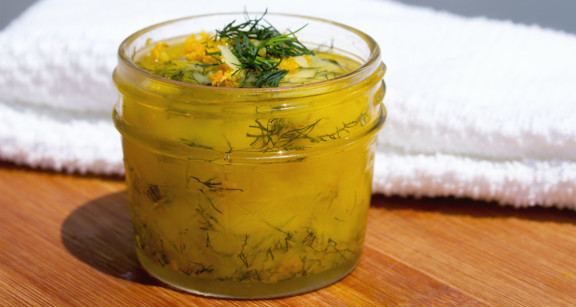
Orange Dill Compound Butter (or Ghee)
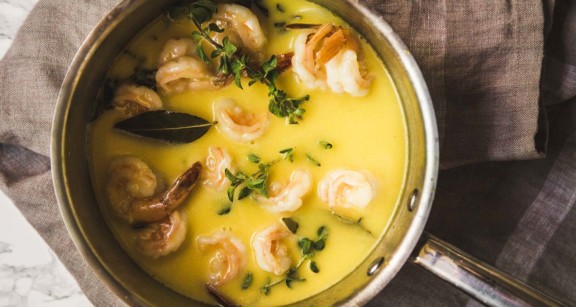
Keto Poached Butter Shrimp
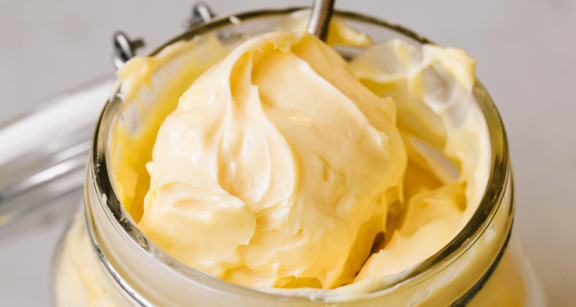
Homemade Butter
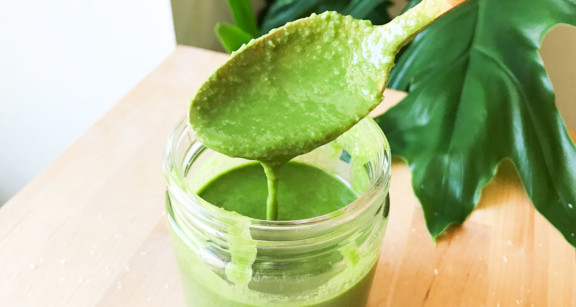
Keto Matcha Coconut Butter
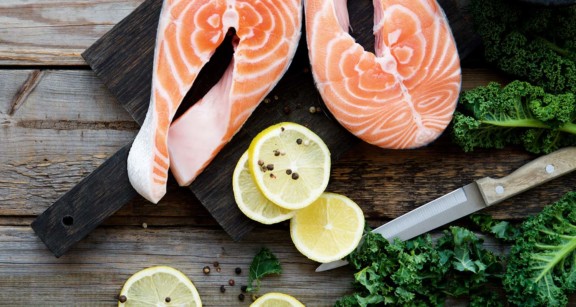
Wild Salmon with Buttered Kale
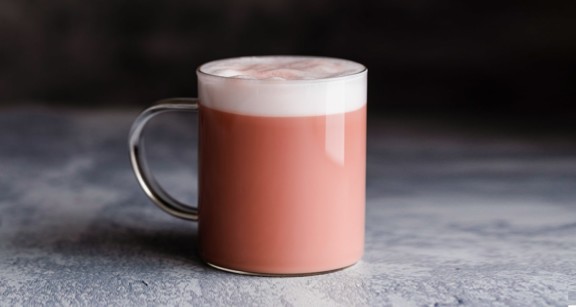
Bulletproof Rooibos Tea Latte
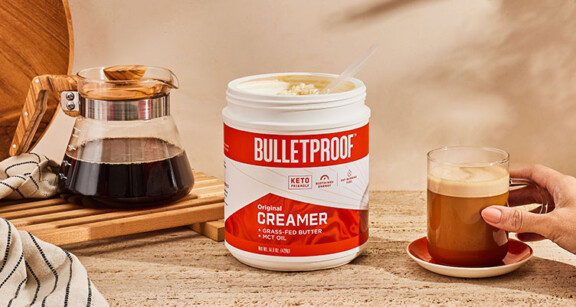
Keto Coffee Recipes to Keep You Happy and Laser-Focused
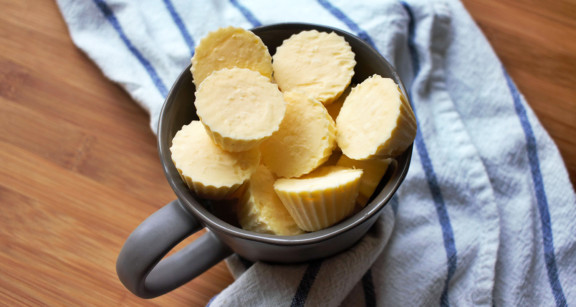
How to Make Bulletproof Coffee Blocks for Busy Mornings
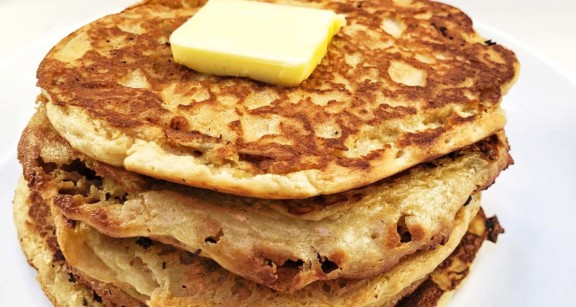
Fluffy Almond Flour Paleo Pancakes
Learn More About Butter
Butter Articles
Health Benefits of Grass-Fed Butter: Why It’s Good for You
Ghee vs Butter: What’s the Difference, and Which is Best?
Greg’s Butter Experiment: Did Butter Replace Statins For Him?
Why Butter Coffee Is the Secret to Burning Fat and Fueling Your Morning
How to Use Cacao Butter, the Keto-Friendly Fat Your Diet Needs
Here’s Why Butter is Actually Good For You [INFOGRAPHIC]
Is Milk Keto? Why Dairy Isn’t as Keto-Friendly as You Think
Is Bulletproof Coffee Good for You? Why You Want Quality Fats in Your Coffee
Conjugated Linoleic Acid: How CLA Helps With Fat Burning and Immunity
FAQs
Healthy fats provide essential nutrients and support well-being. They’re found in foods such as ghee butter, avocados, nuts, seeds and fatty fish, like salmon. They contain omega-3 and omega-6 fatty acids. These fatty acids contribute to heart health, brain function and can help with inflammation.14 Incorporating them in moderation can improve overall wellness.15
Butter can be a nutritious addition to your diet if you include it in moderation. Yes, butter contains saturated fats, which were once associated with heart disease. But recent studies suggest that natural fats, like those in butter, offer many benefits.16 Butter’s fats can enhance the absorption of fat-soluble vitamins like K2 and D. It can also help your body absorb other nutrients important for bone health, such as calcium and magnesium.17 This means your body can better use these nutrients to support bone formation and maintenance.
Saturated fats are solid at room temperature. They primarily come from animal sources like meat and dairy, as well as certain plant oils (like coconut oil and shea butter). They can raise LDL cholesterol levels and increase the risk of heart disease if you eat too much. However, they have many beneficial functions. For example, they contribute to cell structure and stability, help with the synthesis of hormones and facilitate vitamin absorption. Unsaturated fats are usually liquid at room temperature. They are found in plant-based oils, nuts, seeds and fatty fish. They can help lower LDL cholesterol levels and reduce the risk of heart disease if you consume them in moderation.18
Some kinds of butter include salted butter and unsalted butter. There’s also clarified butter (ghee) and European-style butter. Salted butter has added salt for flavor and preservation and is great for cooking, spreading on toast or melting on your vegetables. Unsalted butter is better for recipes where you need to control the salt content, like for certain baked goods. Clarified butter or ghee is butter that has been heated to remove milk solids and water, resulting in a pure butterfat with a higher smoke point. Finally, European-style butter has a higher butterfat content, usually around 82 to 86%. This offers a richer flavor and creamier texture, making it ideal for pastries and desserts.
Butter substitutes are alternatives to traditional butter and can work well as stand-ins depending on what you’re using them for. Common butter substitutes include margarine. Made from vegetable oils, margarine is ideal for spreading and cooking. Vegetable oil spreads mimic butter’s taste and texture, while coconut oil adds a hint of coconut flavor and works well in vegan diets. Avocado and nut butters offer creamy textures and healthy fats, which you can use as alternatives for spreads and recipes.
Yes, butter is keto-friendly because it is high fat and low carb. It contributes to ketosis, a metabolic state where the body burns fat for fuel instead of carbohydrates. Butter is one of the healthy fats for keto and is commonly used for preparing keto-friendly foods and drinks.
Ghee and butter are both dairy fats, but they have some differences. Ghee is clarified butter, meaning it’s been cooked to remove water and milk solids, leaving only pure butterfat. This gives ghee a nuttier taste and a higher smoke point, so it’s great for cooking at high temperatures. Butter still has water and milk solids, giving it that creamy texture and classic buttery flavor we all know and love.
Grass-fed butter has a great nutritional profile. It includes higher levels of healthy fats like omega-3 fatty acids and fat-soluble vitamins. Clarified butter, or ghee, is also very healthy because it contains high levels of vitamin A compared to regular butter.